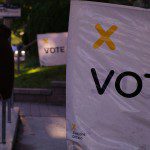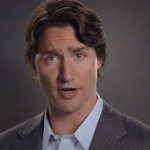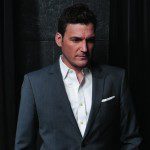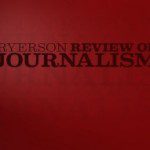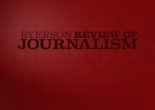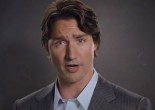Win, Place, Show: Poll Reporting as Bookmarking
Reporting public opinion polls is a firmly entrenched element of election campaign coverage. But whether polls influence election results is the subject of a continuing debate.
Alan Frizell, codirector of the Carleton School of Journalism poll, told The Toronto Star that after the 1980 federal election the school did a poll asking people why they voted as they did. Only four percent of the respondents admitted they were directly influenced by polls, but a further 68 percent said they believed polls might have subconsciously affected their decision.
Some critics argue that news agencies should be prohibited from publishing poll results during elections because the media tend to overemphasize the leading candidate, creating the so-called bandwagon effect. According to proponents of this view, undecided voters get caught up in the enthusiasm surrounding the poll leader and vote for that candidate because he or she seems assured of success.
When addressing the Canadian Public Relations Society in Ottawa last fall, Allan Gregg, president of Decima Research Ltd., dismissed this idea: “Historically that doesn’t hold. Only political barbarians would switch votes to go along with a pack. But polls have an indirect impact in that the notion of who is going to win a campaign structures media coverage.”
Critics of extensive reporting of polls also argue that when the media concentrates on poll results, not enough attention is paid to the important issues of a campaign and how effectively a potential leader can deal with them. Former industry minister Sinclair Stevens, an opponent of the use of polls in election coverage, says, “I think they are not necessary. It’s more important that people assess the issues and come to their own conclusions on the relative strengths and weaknesses of a leader.”
Geoffrey Stevens, managing editor of The Globe and Mail, doesn’t believe polls have a direct effect on voters, but he does feel they can lead to the underdog syndrome, whereby votes swing to candidates who do badly. Stevens believes John Turner’s poor standing in the polls last summer helped him pull off a victory in his Vancouver-Quadra riding. When it appeared that Turner might not even win in his own riding, some voters felt they should help Turner out, says Stevens.
Toronto Star national editor Ian Urquhart also doesn’t believe polls directly affect voters but thinks they can demoralize workers in the party that isn’t doing well, who consequently may not conduct as strong a campaign as they might were they feeling more confident. “So in that way polls indirectly influence the election,”
says Urquhart. He adds that last summer there was “such a proliferation of polls, to the point where people would have been confused. Television stations indiscriminately led off newscasts with reports of the latest poll, no matter who did them.”
To help its readers make sense of the varying results of the different poll takers last summer, Urquhart says the Star used the most recent Gallup poll on the front page and other polls on the inside pages: “By putting the Gallup poll on the front page, we’re signalling to our readers that the Starconsiders that poll the most valid.”
As for polls other than Gallup, such as those done by journalism students at Carleton, CROP (Centre de recherches sur l’opinion publique) and market researchers, Urquhart says the Star prints them because “they are part of the public record. If we didn’t carry them in the paper, readers would start to ask some very real questions about why they weren’t there.”
Joe Fletcher, a political scientist at the University of Toronto’s downtown campus, says although a lot of people feel opinion polls influence some voters, “no one has ever been clever enough to prove it.” He says comprehensive and sophisticated studies would have to be done to prove conclusively that such an influence does or does not exist. Fletcher suggests that those conducting such studies would have to carefully determine what variables have an impact on voters, because any influence would be very subtle. In addition, he believes a control group, completely isolated from news reports on campaigns and the results of polls, would also have to be studied. “It’s a very sticky methodological problem,” he says.
Although there is no concrete proof that polls influence voters, we must consider the possibility that they do because so many people suspect that such surveys exercise at least some indirect influence. It’s time the media started reporting poll results with more discretion. To predict an election winner based on campaign polls, as the media so often do, is nothing less than irresponsible.
This is a joint byline for the Ryerson Review of Journalism. All content is produced by students in their final year of the graduate or undergraduate program at the Ryerson School of Journalism.



